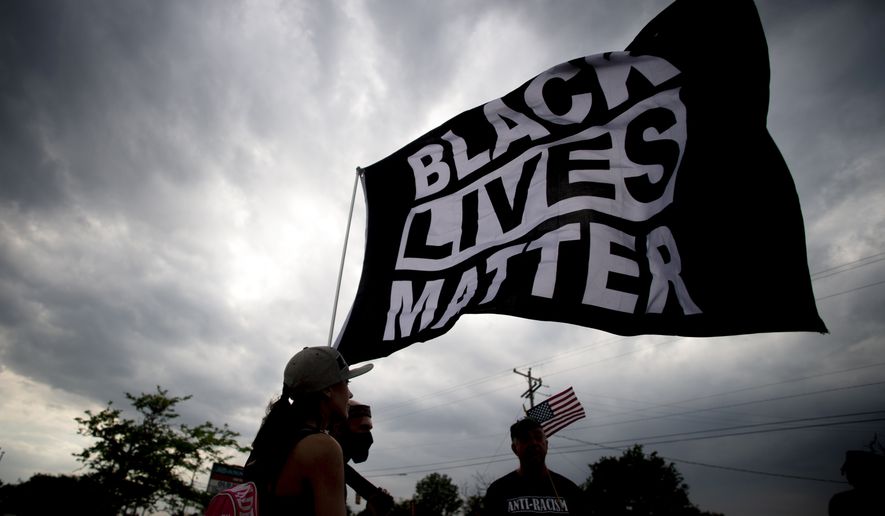The Black Lives Matter movement’s embrace of the Palestinian cause substitutes racial identity for religious autonomy in the Mideast conflict, casting Israel as the aggressor even as antisemitic attacks in the U.S. are on the rise, foreign policy analysts say.
With its popularity among progressives and Democrats intact, BLM threatens to add tinder to the Israeli-Palestinian conflagration by inviting comparisons to the antebellum South, the Civil Rights Movement of the 1960s and ’70s and the white-minority oppression of South Africa, analysts say.
“They have equated Israel with White supremacists and Palestinians with Blacks. Now, the rhetoric of progressives has become seeing Israel and Gaza through the lens of race and Black Lives Matter,” said Noah Pollack, executive director of the Democratic Alliance Initiative, an analysis group critical of the foreign policy goals and outcomes of the Obama administration.
Mr. Pollack said the alliance between BLM and Palestinians is predicated on a profound but deliberate misrepresentation of what is happening in Israel, where threads between Hamas terrorists in the Gaza Strip and the Palestinian resistance are impossible to separate.
“It is really, at once, very clever and very stupid,” he said.
In addition, BLM has aligned its racial justice cause with the Boycott, Divestment and Sanctions (BDS) movement, which seeks to move American institutions from a perceived pro-Israel position to one linked with the Palestinian cause.
“I think they’ve just made explicit what was always there, as they used to try to play it both ways despite clear-cut signs,” said Ricki Hollander with the Committee for Accuracy in Middle East Reporting and Analysis (CAMERA). “BLM in no uncertain terms is in solidarity with Palestine. There is this nexus between the two groups, BLM and BDS, and nobody is trying to hide it anymore.”
The official BLM Twitter feed made the alliance explicit on May 17: “Black Lives Matter stands in solidarity with Palestinians. We are a movement committed to ending settler colonialism in all forms and will continue to advocate for Palestinian liberation. (always have. And always will be). #freepalestine.”
The tweet came just after Hamas had sent rockets into Israel and just before a rash of anti-Semitic attacks from New York City to Los Angeles that authorities say they are investigating as possible hate crimes.
What’s more, Melissa Abdullah, a professor of Pan American studies at California State University-Los Angeles and a founder of the Black Lives Matter chapter there, generated a raft of comments on Twitter this week about her comments making a direct link between the Palestinians fighting Israel and racial tensions in the U.S.
“We understand that the liberation of Black people in the United States is tied to the liberation of Black people all over the world, and … to the liberation of #oppressed people all over the world. #Palestine #Israel,” she said in a comment to The Washington Post that was shared widely on social media.
“The zeitgeist today is that the Middle East is like the civil rights cause in America in the 1960s,” Mr. Pollack said.
And in the “Invest & Divest” section of the webpage M4BL or The Movement for Black Lives that works closely with BLM, Israel is declared guilty of apartheid and genocide — and, by extension, so is the United States.
“The US justifies and advances the global war on terror via its alliance with Israel and is complicit in the genocide taking place against the Palestinian people,” it reads. “The results of this policy are twofold: it not only diverts much needed funding from domestic education and social programs, but it makes US citizens complicit in the abuses committed by the Israeli government.”
Leveling accusations of apartheid and genocide is a dangerous move that could encourage violent reactions like those that have sparked in some U.S. cities in the past several days, said Howard Stoffer, a professor of national security at the University of New Haven who was stationed in Israel with the State Department in the 1980s.
These connections are not lost on Democratic lawmakers who have increased pressure on the Biden administration to put more daylight between the United States and Israel. Rep. Alexandra Ocasio-Cortez of New York declared Israel was guilty of apartheid on Twitter, then later condemned antisemitic attacks in Manhattan, while Michigan Democratic Rep. Rashida Tlaib called Israel “an apartheid government” on the floor of the House.
“‘Apartheid’ is a very loaded, dangerous term,” Mr. Stoffer said. “The Palestinians have always been masterful at portraying themselves as victims no matter what they do and Israel as the aggressor.”
A cease-fire that went into effect last Friday has quelled the 11-day war between Israel and Hamas, for now. The Biden administration sent Secretary of State Antony Blinken to the Middle East with assurances the U.S. remains firmly behind Israel.
According to U.N. High Commissioner for Human Rights Michelle Bachelet, the conflict killed at least 248 people in the Gaza Strip, including 66 children and 39 women. In Israel, 12 people were killed, including two small children.
Hamas, which is backed by the Islamist regime of Iran, fired more than 4,300 rockets into Israel, and the Israeli Defense Force conducted hundreds of airstrikes on buildings and infrastructure in Gaza, saying the militants use civilians as human shields.
The Palestinian militant group — which calls for the destruction of the Jewish state — frequently fires one or two rockets into Israel, but its last major conflict with Israeli forces occurred in a 50-day war in 2014 that killed hundreds and left more than 141,000 homes destroyed.
The Gaza Strip has been governed by Hamas since the group seized power from the Palestinian Authority in 2007, which resulted in a tight blockade by Israel and Egypt. Since then, Palestinian President Mahmoud Abbas has governed autonomous areas of the Israeli-occupied West Bank and has limited influence in Gaza.
⦁ This article is based in part on wire service reports.
• James Varney can be reached at jvarney@washingtontimes.com.




Please read our comment policy before commenting.